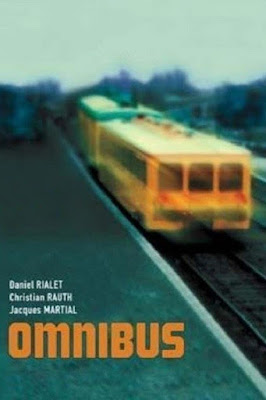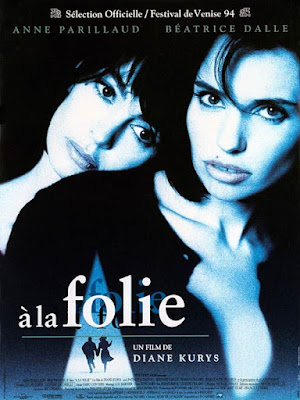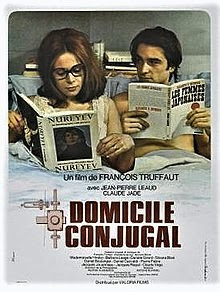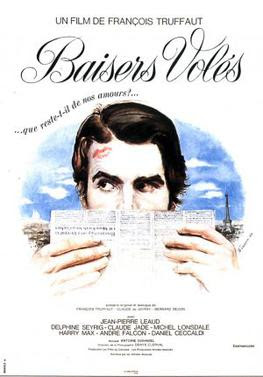This is a monster film for Alain Resnais, even if it's not his best: but then what could be this hugely important director's worst? Time, and in some respects memory, are inevitably important here, in what can (very liberally) be described as a quirky (and brilliant) musical. Resnais dedicates this to Denis Potter, who died a few years before, and is most famous for the lip-synching of such television plays as 'The Singing Detective' and 'Lipstick on your Collar'.
Here though, it's not whole songs that are heard, but snatches of them, in total thirty-six in forty-seven interventions. They represent private thoughts sung by the original performers but mimed by the actors, and can represent an emotion clearly manifested in the film but more likely represent private, secret thoughts known only to the actor or the audience. But the songs spread over a wide period of time, and it is highly unlikely that many (if any) even French viewers recognise all of the songs, which stretch over seventy-three years, ranging from Albert Préjean's 'Je m'donne' (1921) through to Michel Sardou's 'Déjà vu' (1994), passing by Édith Piaf, Charles Aznavour, Serge Gainsbourg, Léo Ferré, Sheila, Alain Bashung, Téléphone, etc.
Certainly any French person – or any lover of Francophone popular music – will recognise a number of these songs, although the internationally known Georges Brassens, Jacques Brel or Georges Moustaki aren't represented. What they'll recognise is their own history, their own memories through the time they've lived, grafting many more personal stories onto this particular one.
For all that, the general narrative is fairly simple: Claude Lalande (Pierre Arditi) is married to Odile (Sabine Azéma) who wants to move to a new dream apartment through estate agent Marc Duveyrier (Lambert Wilson); Odile's younger sister is Camille (Agnès Jaoui), who is coming to the end of seven years studying 'Les Chevaliers paysans de l'an 1000 au lac de Paladru' for a doctorate but is also working as a tour guide; Odile's former lover hypercondriac Nicolas (Jean-Pierre Bacri), who is married and has been living in England, has just returned to Paris to find work and bring his family over; Simon (André Dussollier) works as a clerk with Marc as boss, writes radio plays more as a hobby than a source of revenue, and is secretly in love with Camille, following her tours when time permits; Marc is an egotistical womaniser who is Simon's boss, and whose latest conquest is Camille.
History is not only important via the songs or the characters' past but through other things: Camille lectures her ever-changing groups on such things as France's Nazi past, le Parc des Buttes-Chaumont with its Temple de la Sibylle and Pont des Suicidés, the house of the Marquise de Brinvilliers (on whom Simon has written a play), the Cimetière du Père Lachaise (where the famous erection of Victor Noir is scrupulously avoided, probably because too well known therefore a cliché), and so on. Obviously the sights here are off-centre, and even the sculpture near the estate agent, la Fontaine des Polypores in the 15e arrondissement, built in 1983, is hardly on the normal tourist circuit.
Through this web of relationships lie a tangle of lies, half-truths, misunderstandings, inaccuracies, etc. Nicolas is pretending not to be a humble chauffeur, Claude has a much younger lover, Simon pretends to have a profession as a playwright and not also a lowly estate agent clerk, when he meets Camille Marc goes along with the pretence that he was crying and snivelling over a relationship rather than a cold, but most of all he lied by omission because Odile and Claude's wonderful flat with its superb view will soon have the view wiped out by what looks like a horrendous HLM.
All will come out in the house-warming, but particularly Marc's lie by omission, which is not the only thing to cause electric, poisonous atmosphere by the appearance of the jellyfish, but the ending is quite cataclysmic. A superb film.
From Wikipédia, the songs:
Joséphine Baker : J'ai deux amours (Götz Burger)
Dalida et Alain Delon : Parole parole (Jean-Pierre Bacri et Sabine Azéma)
Charles Aznavour : Et moi dans mon coin (Pierre Arditi)
René Koval : C'est dégoûtant mais nécessaire (Sabine Azéma)
Simone Simon : Afin de plaire à son papa (Sabine Azéma)
Gaston Ouvrard : Je n'suis pas bien portant (Jean-Pierre Bacri)
Albert Préjean : Je m'donne (Lambert Wilson)
Jacques Dutronc : J'aime les filles (Lambert Wilson)
Michel Sardou : Déjà vu (André Dussollier)
Gilbert Bécaud : Nathalie (André Dussollier)
Maurice Chevalier : Dans la vie faut pas s'en faire (Lambert Wilson)
Arletty et Jean Aquistapace : Et le reste ? (Agnès Jaoui et Lambert Wilson)
Édith Piaf : J'm'en fous pas mal (Agnès Jaoui)
Alain Bashung : Vertige de l'amour (André Dussollier)
Sheila : L'école est finie (Sabine Azéma)
Serge Lama : Je suis malade (Jean-Pierre Bacri)
Léo Ferré : Avec le temps (Jean-Pierre Bacri)
Henry Garat : Avoir un bon copain (André Dussollier)
Jane Birkin : Quoi (Jean-Pierre Bacri et André Dussollier)
France Gall : Résiste (Sabine Azéma)
Henry Garat : Amusez-vous (Lambert Wilson)
Charles Richard : La tête qu'il faut faire (Lambert Wilson et Sabine Azéma)
Alain Souchon : Sous les jupes des filles (Sabine Azéma)
Eddy Mitchell : La Dernière Séance (Jean-Pierre Bacri)
Sylvie Vartan : La plus belle pour aller danser (Lambert Wilson, Sabine Azéma, etc)
Serge Gainsbourg : Je suis venu te dire que je m'en vais (Pierre Arditi)
Eddy Mitchell : Je vous dérange (André Dussollier)
Téléphone : Ça (c'est vraiment toi) (Pierre Arditi et autres acteurs)
Dranem : Quand on perd la tête (Sabine Azéma)
Johnny Hallyday : Ma gueule (André Dussollier)
Pierre Perret : Mon p'tit loup (Pierre Arditi)
Claude François : Le Mal-aimé (Lambert Wilson)
Michel Jonasz : J'veux pas qu'tu t'en ailles (Jean-Pierre Bacri)
Julien Clerc : Ce n'est rien (André Dussollier)
Claude François : Chanson populaire (Pierre Arditi)
Eddy Mitchell : Le Blues du blanc (Lambert Wilson)



































